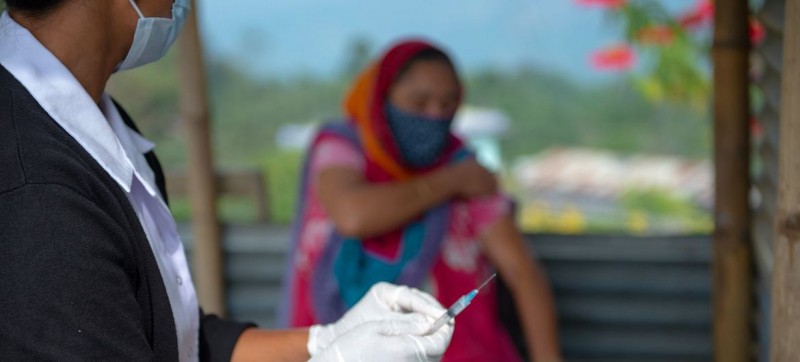Contents
COVID vaccines are being administered at a village clinic in Kohima, India. The highest number of COVID-19 cases so far in the pandemic were reported last week across the globe, the head of the World Health Organization (WHO) told journalists on Thursday. In his first briefing of 2022, WHO chief Tedros Ghebreyesus repeated his longstanding call for vaccine equity and solidarity to defeat the crisis, now reaching into its third year.
"We need #VaccinEquity, treatment equity, test equity and health equity and we need your voices to drive that change.
Equity, equity, equity."-@DrTedroshttps://t.co/fjxtg9rZQ3— World Health Organization (WHO) (@WHO) January 6, 2022
“The dawn of a new year offers an opportunity to renew our collective response to a shared threat,” he said, speaking from Geneva.
“I hope global leaders who have shown such resolve in protecting their own populations will extend that resolve, to make sure that the whole world is safe and protected.”
WHO is set to publish its latest weekly epidemiological report on COVID-19 on Thursday.
It shows that case numbers increased at a global level by 71 per cent over the past seven days, according to Dr. Maria Van Kerkhove, the agency’s technical lead on COVID-19, speaking later in the briefing.
During this period, some 9.5 million cases were reported, “and we know that that is an underestimate,” she said, adding that “next week will be higher, because in the last 24 hours, more than 2.2 million cases were reported.”
Inequity kills
Tedros described vaccine inequity as “a killer of people and jobs”, which is also undermining global economic recovery. Low vaccination rates have also created the perfect conditions for virus variants to emerge.
He said the “tsunami” of Omicron cases has been overwhelming health systems across the world.
“While Omicron does appear to be less severe compared to Delta, especially in those vaccinated, it does not mean it should be categorized as ‘mild’,” he cautioned.
Although first-generation vaccines may not stop all COVID-19 infections and transmission, Tedros stressed that they remain highly effective in reducing hospitalizations and deaths.
Falling short
WHO has been advocating for countries to vaccinate 70 per cent of their populations by the middle of 2022. Tedros warned that at the current pace, some 109 countries could miss this target.
“The essence of the disparity is that some countries are moving toward vaccinating citizens a fourth time, while others haven’t even had enough regular supply to vaccinate their health workers and those at most risk,” he said.
“Booster after booster in a small number of countries will not end a pandemic while billions remain completely unprotected.”
The world can end vaccine inequity firstly by effectively sharing the doses that are being produced, he said.
“Second, let’s take a ‘never again’ approach to pandemic preparedness and vaccine manufacturing so that as soon as the next generation of COVID-19 vaccines become available, they are produced equitably and countries don’t have to beg for scarce resources,” he advised.
For its part, WHO will continue to invest in vaccine manufacturing hubs and work with any and all manufacturers willing to share know-how, technology and licenses.
Tedros was encouraged by some of the vaccines currently undergoing trial whose makers have already committed to waiving patents and sharing licenses, technology and know-how.
He also appealed for investment in public health and health systems, including to ensure strong surveillance and adequate testing, and workers who are supported and protected.
The WHO chief further called on people across the world to demand that governments and pharmaceutical companies share health tools globally to bring an end to the pandemic.

An woman attends a consultation before receiving her COVID-19 vaccination in Herat city, Afghanistan. (file)
Responding to crises
No place is the message of equity more true than in countries or regions dealing with humanitarian crises and conflict zones, said Tedros.
WHO is on the ground in these locations, reaching people with aid and supplies.
In Afghanistan, he said that until recently, over three quarters of health facilities had reported stock-outs of essential medicines, while there was also a threat to keeping health workers on the job.
As of December, over 2,300 health facilities had received new supplies. Additionally, 25,000 health workers have been paid, ensuring the functionality of 96 per cent of the country’s health system, through a joint effort between WHO and sister agency, the UN Children’s Fund (UNICEF).
In war-torn northern Ethiopia, WHO dispatched some 14 metric tonnes of medical supplies to Afar, and another 70 metric tonnes to Amhara last month.
However, the agency has not been permitted to deliver supplies to the crisis-wracked Tigray region since mid-July, despite repeated requests.
Tedros remarked that “the defacto blockade is preventing access to humanitarian supplies, which is killing people.”



